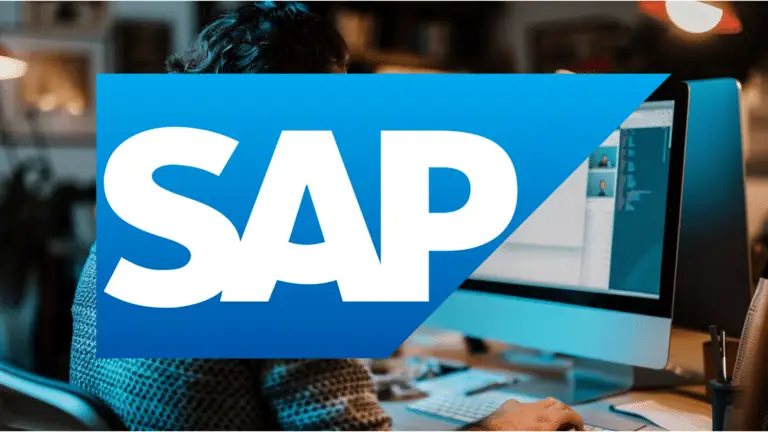| Nom | Description | |
|---|---|---|
| 1 | SAP Business Network | Connects company systems and processes for efficient transactions and collaborations. |
| 2 | SAP Business Technology Platform (SAP BTP) | Drives innovation and digital transformation with centralized data and advanced analytics. |
| 3 | SAP Customer Experience et CRM | Optimizes customer interactions and personalizes offers for better customer relationship management. |
| 4 | SAP S/4HANA Cloud | Manages and optimizes business processes with an integrated ERP platform. |
| 5 | SAP Logiciels de gestion financière | Places finance at the core of the company with optimized business models and risk reduction. |
| 6 | SAP SuccessFactors HCM | Enhances human resource management with cloud-based and AI-powered tools. |
| 7 | SAP Logiciels de gestion des services | Connects every customer interaction to operations for unified service resolution. |
| 8 | SAP Business One et SAP Business ByDesign | Efficiently manages SME operations with real-time insights and future-ready growth. |
| 9 | SAP Ariba, SAP Fieldglass et SAP Concur | Optimizes and reduces expense management costs for businesses. |
| 10 | SAP Supply Chain Management (SAP SCM) | AEnhances the supply chain by connecting and contextualizing processes. |
| 11 | SAP Sustainability Control Tower | Records, reports, and acts on sustainability goals by tracking real-time ESG data. |
What is SAP?
SAP is a European multinational company specializing in the development of management software for business processes. Considered by many as the most efficient on the market, SAP is used worldwide.
Founded in 1972, in Mannheim, Germany, by former IBM employees, SAP stands for “Systems, Applications, and Products in Data Processing.” It is known for its Enterprise Resource Planning (ERP) solutions, Cloud, Business Intelligence (BI), Internet of Things (IoT), and artificial intelligence (AI). These solutions enable businesses to manage their operations efficiently and centralize their data on a unique platform.
Objectives and missions of SAP
The main objectives of SAP are to help businesses optimize profitability and ensure sustainable growth. To achieve these goals, SAP develops software solutions covering all aspects of business management, including:
- Production
- Customer satisfaction
- Financial management
- Human resource management
How SAP helps companies and organizations?
SAP software centralizes data and makes it accessible in real-time to all company functions. This helps reduce costs, improve operational efficiency, increase productivity, and enhance customer experience.
For example, a SAP ERP can integrate modules for purchasing, inventory management, accounting, human resources, and many other essential functions, facilitating an integrated and coherent management of a company’s operations.
What are SAP ERP software?
Today, businesses face a multitude of challenges that can hinder their growth and efficiency, such as inefficient resource and operation management, lack of adaptation to rapid market changes, and complexity of financial management.
To help them, SAP offers a wide range of ERP software solutions designed to meet the varying needs of businesses of all sizes:
SAP Business Network – enterprise network management
SAP Business Network is a B2B network offering a complete range of tools, analytics, and supplier services to meet customer expectations and business needs, whether established or new to the market. By joining this network, companies can leverage new sales opportunities and improve process efficiency, thus fostering the growth of B2B e-commerce activities.

SAP Business Technology Platform – digital transformation platform
The SAP Business Technology Platform (SAP BTP) is designed to drive innovation and digital transformation. It allows businesses to customize and extend SAP applications, integrate and connect different environments, and enhance decision-making through centralized data and advanced analytics. SAP BTP integrates technologies such as artificial intelligence, automation, and low-code and pro-code development tools to optimize business processes.

SAP Customer Experience and CRM – customer relationship and experience management
SAP Customer Experience (CX) and Customer Relationship Management (CRM) solutions are designed to offer innovative and engaging customer experiences. These integrated solutions help companies better understand their customers, optimize interactions, and personalize offers. SAP provides advanced tools for customer data management, sales automation, omnichannel marketing, and customer service, ensuring a comprehensive and effective management of the customer journey.

SAP S/4HANA Cloud – integrated management software (ERP)
SAP S/4HANA Cloud is designed to manage and optimize business processes on a single platform. For example, S/4HANA Cloud integrates artificial intelligence and analytics capabilities, enabling companies to transform operations and drive innovation. This modular software adapts to the needs of each business, facilitating integrated management of various functions such as finance, supply chain, and human resources.
Nestlé improved the availability and agility of its processes using SAP Commerce Cloud, achieving 99.97% availability.

SAP Financial Management Software
SAP Financial Management Software is designed to place finance at the core of the company. It offers new business models, optimizes working capital, enhances efficiency, and reduces risks. The tool uses predictive analytics and subscription billing to provide forward-looking insights and accurate cashflow forecasts.
Companies like F. Hoffman-La Roche use SAP to automate Order-to-Cash processes in their new digital offerings, while Diakonie Nord Nord Ost standardized its financial processes to advance towards digitalization.

SAP SuccessFactors HCM – Human Capital Management (HCM)
SAP Human Capital Management (HCM) is a comprehensive software suite designed to enhance human resource management in companies. Cloud-based and incorporating AI, the SAP SuccessFactors HCM suite helps create exceptional employee experiences and make smart personnel decisions. Used by over 10,000 companies worldwide, this solution connects HR functions to all aspects of the business.

SAP Service Management Software
SAP Service Management Software enables companies to connect every customer interaction with operations, offering a unified service resolution. This solution fosters customer loyalty, boosts revenue, and reduces environmental impact. SAP offers tools to reinvent service models, ensure service accuracy, and revolutionize equipment performance.

SAP Business One and SAP Business ByDesign – software for SMEs/Mid-market
SAP solutions for SMEs/Mid-market are designed to go beyond simple accounting software. They incorporate proven industry practices and can adapt to the specific needs of small and medium-sized enterprises. With solutions like SAP Business One and SAP Business ByDesign, SMEs/Mid-market can efficiently manage operations, access real-time insights, and prepare for future growth.

SAP Ariba, SAP Fieldglass and SAP Concur – expense management
SAP offers comprehensive expense management solutions allowing businesses to control, optimize, and reduce their costs. Key solutions include SAP Ariba for direct and indirect purchasing, SAP Fieldglass for external workforce management, and SAP Concur for travel and expense management. These tools offer a unified view of expenses, facilitating effective and strategic management. SAP expense management solutions are used in various companies to improve transparency and resilience of processes.

SAP Supply Chain Management (SAP SCM) – supply chain management
The SAP Supply Chain Management (SAP SCM) software is designed to connect, contextualize, and collaborate across the entire supply chain. It eliminates process silos, anticipates disruptions, and creates feedback loops to improve company performance. By using AI, SAP SCM helps guide decision-making, reduce errors, and integrate sustainability into daily operations.
Many companies, such as Kimberly-Clark and Freeport-McMoRan, use SAP SCM to optimize their supply chains. For example, Kimberly-Clark uses this software to efficiently manage the production and distribution of household goods, ensuring complete and timely deliveries.

SAP Sustainability Control Tower – sustainability management
The SAP Sustainability Control Tower is designed to help businesses record, report, and act on their sustainability goals. It tracks ESG (environmental, social, and governance) data in real-time, using actual data rather than averages, and provides sustainability metrics ready for audit. This solution integrates sustainability into business processes, offering actionable insights, accurate forecasts, and robust planning to achieve previously unattained sustainability goals.
Many companies use the SAP Sustainability Control Tower to improve transparency and trust among stakeholders. Salzgitter AG uses it to reduce their carbon footprint and sustainably transform their sector. Similarly, msg global uses it to define and track its ESG objectives, ensuring robust and verifiable reporting.

What are the benefits of using SAP software?
Time-saving and productivity
SAP software centralizes data and automates numerous business processes, allowing companies to save valuable time. By eliminating repetitive manual tasks, employees can focus on higher-value activities, thus increasing their overall productivity.
Improvement of internal collaboration
Through an integrated platform, SAP facilitates collaboration between different departments of a company. With real-time accessible data, teams can work more coherently and efficiently, sharing essential information without traditional data silos.
Reduction of duplication and error risks
By centralizing data in a single database, SAP software significantly reduces the risks of duplication and errors. Information is entered once and updated in real-time, which improves data accuracy and minimizes inconsistencies.
Increase in profits
By optimizing internal processes and improving operational efficiency, SAP software enables companies to reduce their costs and increase profits. Better resource management, combined with more informed decision-making, contributes to sustainable and profitable growth.
How to get trained on the SAP suite?
Training options (in-company, academic, CPF)
SAP training options are varied and flexible:
- In-company: there are tailor-made training courses delivered by certified SAP consultants or approved partners, adapted to the specific needs of the organization.
- Academic: academic programs including modules on ERP and SAP, leading to degrees such as a bachelor’s or master’s degrees in information systems management.
- Personal Training Account (CPF): certifying training accessible and fundable by CPF, allowing employees and job seekers to develop SAP skills.
Available SAP certifications
SAP offers SAP certifications that attest to the competence and expertise of professionals in using SAP solutions. They are recognized worldwide and cover various domains such as finance, logistics, human resource management, and more. Obtaining a SAP certification can significantly improve career prospects and professional recognition.

Getting trained on SAP with DataScientest
DataScientest offers professionals wishing to acquire ERP skills the opportunity to train on the SAP software suite. The institution provides specialized training in SAP Finance and SAP Supply Chain, enabling learners to master the most advanced SAP tools.
SAP Finance Training
The SAP Finance training by DataScientest is designed to optimize financial processes and drive digital transformation in companies. It includes modules on financial accounting, managerial accounting, and asset management. The program is intensive and structured to cover all necessary aspects of financial management with SAP, including preparation for the SAP S/4HANA for Financial Accounting Associates (TS4-FI) certification.
SAP Supply Chain Training
The SAP Supply Chain training by DataScientest aims to optimize supply chains and manage digital transformation in companies. Learners discover how to select and analyze performance indicators, control compliance of operational actions, and adopt best practices in supply chain management. This training also includes practical exercises to implement learned concepts, using DataScientest’s personalized teaching platform.










